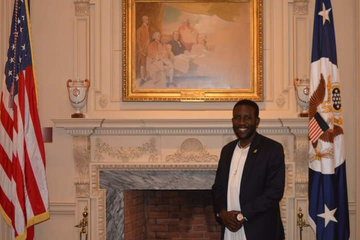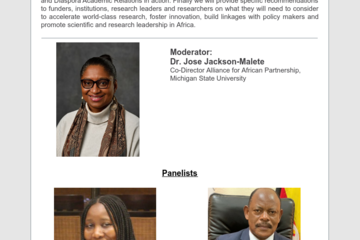Feed
-
ArticleWebinar: Graduate School Application and Experience in North America and Europe-Lagos Studies Assoc.Webinars will be held October, 3, 10, 17, and 24 hosted by the Lagos Studies Association At its annual Conference, the Lagos Studies Association organizes workshops on graduate school application and experience in North America and Europe, featuring graduate school faculty and students. Unfortunately, COVID-19 pandemic did not allow the conference to hold this year. We are happy to hold these events via Zoom Webinars on October 3, 10, 17, and 24. See full schedule below. Graduate School Application and Experience in North America: Perspectives from Graduate Students Date: October 10 Time: 5-7pm (Nigeria Time) Panelists Chair: Tosin Gbogi (Marquette University/African Literature and Popular Culture) Discussants Ayodeji Adegbite (University of Wisconsin-Madison) Samuel Kehinde Adesubokan (University of Victoria) Esther Ajayi-Lowo (Texas Woman’s University) Omoyemi Ajisebutu (Northwestern University) Theophilus Okunlola (University of Wisconsin-Madison) Yolanda Osondu (University of Calgary) Topics for discussion include but not limited to the following: • Preparing for the Graduate Record Examination • Taking the Test of English as Foreign Language/Navigating waiver • Choosing graduate program and writing statement of purpose • Coursework, qualifying exam, and reading concentration • Adjusting to a new academic culture • Conducting fieldwork and sourcing for external funding • Writing your dissertation and preparing for the job market Please click the link below to join the webinar: https://us02web.zoom.us/j/86544791933?pwd=aXBuaC9zNVNnOHM0WnNIWnpyWURYZz09 Webinar ID: 865 4479 1933 Passcode: 990616 Also via LSA Facebook Page: https://www.facebook.com/groups/205111409881162 ---------- Graduate School Application and Experience in Europe: Perspectives from Graduate School Faculty Date: Oct. 17 Time: 5-7pm (Nigeria Time) Panelists Panel Chair: Oliver Coates (University of Cambridge/History) Discussants Shola Adenekan (University of Amsterdam/African Literature and New Media) Simidele Dosekun (London School of Economics and Political Science/Feminist Studies) Emilie Guitard (French National Center for Scientific Research/Anthropology) Steven Pierce (University of Manchester/History) Dmitri van den Bersselaar (Leipzig University /History) Topics for discussion include but not limited to the following: • Things to consider when picking graduate program • Contacting prospective supervisors: Dos and Don’ts • What admission committees look for in application dossier • Writing competitive PhD proposal • Funding for graduate education Please click the link below to join the webinar: https://us02web.zoom.us/j/83891051455?pwd=aG8zeEwydWUvT0NScEFtOEluQjBLUT09 Webinar ID: 838 9105 1455 Passcode: 787421 Also via LSA Facebook Page: https://www.facebook.com/groups/205111409881162 ---------- Graduate School Application and Experience in Europe: Perspectives from Graduate Students Date: Oct. 24 Time: 5-7pm (Nigeria Time) Panelists Panel Chair: Peter Oderinde (University of Basel) Discussants Daniel Chukwuemeka (University of Bristol) Tolulope Ilesanmi (University of Basel) Jammie Titilayo (Technische Universität Darmstadt) Seun Williams (The Graduate School of International and Development Studies) Topics for discussion include but not limited to the following: • Things to consider when picking graduate program • Contacting prospective supervisors: Dos and Don’ts • What admission committees look for in application dossier • Writing competitive PhD proposal • Funding for graduate education Please click the link below to join the webinar: https://us02web.zoom.us/j/85076855946?pwd=R2MvV3RzR2RIN0NGTkp3UndXVVpiZz09 Webinar ID: 850 7685 5946 Passcode: 848810 Also via LSA Facebook Page: https://www.facebook.com/groups/205111409881162By: Amy JamisonMonday, Aug 16, 2021EDUCATION+1
 No Preview Available
No Preview Available -
PostUSAID's new higher education on-line learning module--This learning module covers how investing in higher education programming can be transformational, key elements of USAID Higher Education programming, milestones and lessons, cross-cutting considerations, and higher education reporting indicators. https://www.edu-links.org/online-learning-modules#HEBy: Amy JamisonMonday, Aug 16, 2021EDUCATION
 No Preview Available
No Preview Available -
ArticleDepartment of State Fellows Alumnus Continued Success!AAP is excited to share that Raymond Musiima, an MSU alumnus of the U.S. Department of State, Bureau of Educational and Cultural Affairs' Professional Fellows Program, recently received a grant from Comic Relief to work with young refugees in Uganda to address mental health issues through sports. The program, Obstacle Race Against Stigma and Shame, is set to launch January 2021 and continue through the end of 2024. We congratulate you Raymond on the continued success!By: Elaina LawrenceMonday, Aug 16, 2021EDUCATION

-
ArticleAAU Virtual African Academic Diasporic Homecoming Side EventOn 29 September at 12:30 PM EDT, the AAP, will be hosting a side event webinar on "Building women research leaders from African Institutions – Sharing perspectives" during the Association of African Universities Diaspora Conference. The event will be moderated by one of our very own co-directors, Dr. Jose Jackson-Malete, and she will be joined by panelists: - Professor Ama de-Graft Aikins, British Academy Global Professor, Institute of Advanced Studies, UCL - Professor Barnabas Nawangwe, Vice Chancellor of Makerere University - Ms. Millicent L. Liani, DELTAS PhD Fellow, Center for Capacity Research at LSTM - Dr. Welore Tamboura, Lecturer from Université des Lettres et des Sciences Humaines de Bamako Click on the link below to register: https://msu.zoom.us/webinar/register/WN_oHfxIxvZRFK4igInnmb8jw?fbclid=IwAR3E-EEjSk-O0pPKUNrhIRtrLz4q2MIhSK1DAi09NkO1nPek7_ATvAT2af4By: Elaina LawrenceMonday, Aug 16, 2021CULTURE AND SOCIETY+1

-
PostFAO webinar on September 30, 2020-- The Power of Youth for Agricultural Transformation: A View from Sub-Saharan Africa Register here: https://fao.zoom.us/webinar/register/WN_vbCB0KdPSrGYfAjcRIeArgBy: Amy JamisonMonday, Aug 16, 2021AGRI-FOOD SYSTEMS+1
No Preview Available -
PostStarting September 28th, WE4F’s Regional Innovation Hubs (RIHs) will host four virtual kick-offs. The hubs work with innovators, investors, and other partners to provide technical and/or financial assistance, improve enabling environments, and develop other regional activities. Each RIH will discuss the countries they cover, their operations, and what comes next. Learn more about each hub and find out how to become a partner: https://we4f.org/innovator-news/join-the-we4f-regional-innovation-hub-virtual-kickoff-callsBy: Amy JamisonMonday, Aug 16, 2021AGRI-FOOD SYSTEMS+1
 No Preview Available
No Preview Available -
ArticleGender-Specific Livelihood Strategies for Coping with Climate Change-Induced Food InsecurityThis study assessed the livelihood strategies adopted by husbands and wives within the same households for coping with climate- induced food insecurity in Southeast Nigeria. Collective and bargaining approaches were used in collecting individual and intra- household-level data of 120 pairs of spouses in Southeast Nigeria; husbands and wives were interviewed separately. Focus group discussions, key informant interviews, and household surveys were used to elicit responses from the respondents. Quantitative data for the study were analyzed using percentage, mean scores, and multinomial logit regression analysis. Results of the study revealed that 90% of the wives were more food insecure than their husbands (79.2%). The respondents noted that the observed changes in the climate contributed immensely to their food insecurity situation. To cope with food insecurity, a slightly higher proportion (47.3% and 14.2%) of wives adopted on-farm and non-farm strategies, respectively, while men (39.8%) adopted more off-farm strategies (38.5%). Additionally, results of the multinomial logit regression revealed that market distance and credit access significantly influenced the choice of husbands’ and wives’ engagement in off-farm livelihood strategy; sourcing infor- mation on climate change issues significantly influenced women’s choice of engagement in off-farm/non-farm strategy; and receiving remittances significantly influenced men’s choice of engagement in non-farm strategy. The study concluded that, although women play crucial roles in addressing food insecurity within their households, gender-specific obstacles typically impede their abilities to cope with climate-induced food insecurity.By: Ifeoma AnugwaMonday, Aug 16, 2021AGRI-FOOD SYSTEMS

Leave a comment